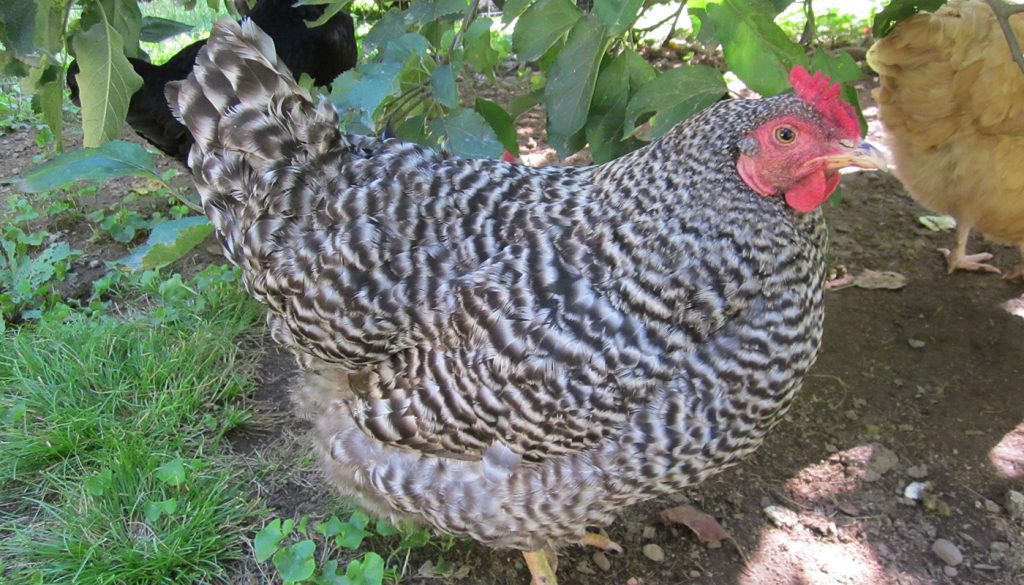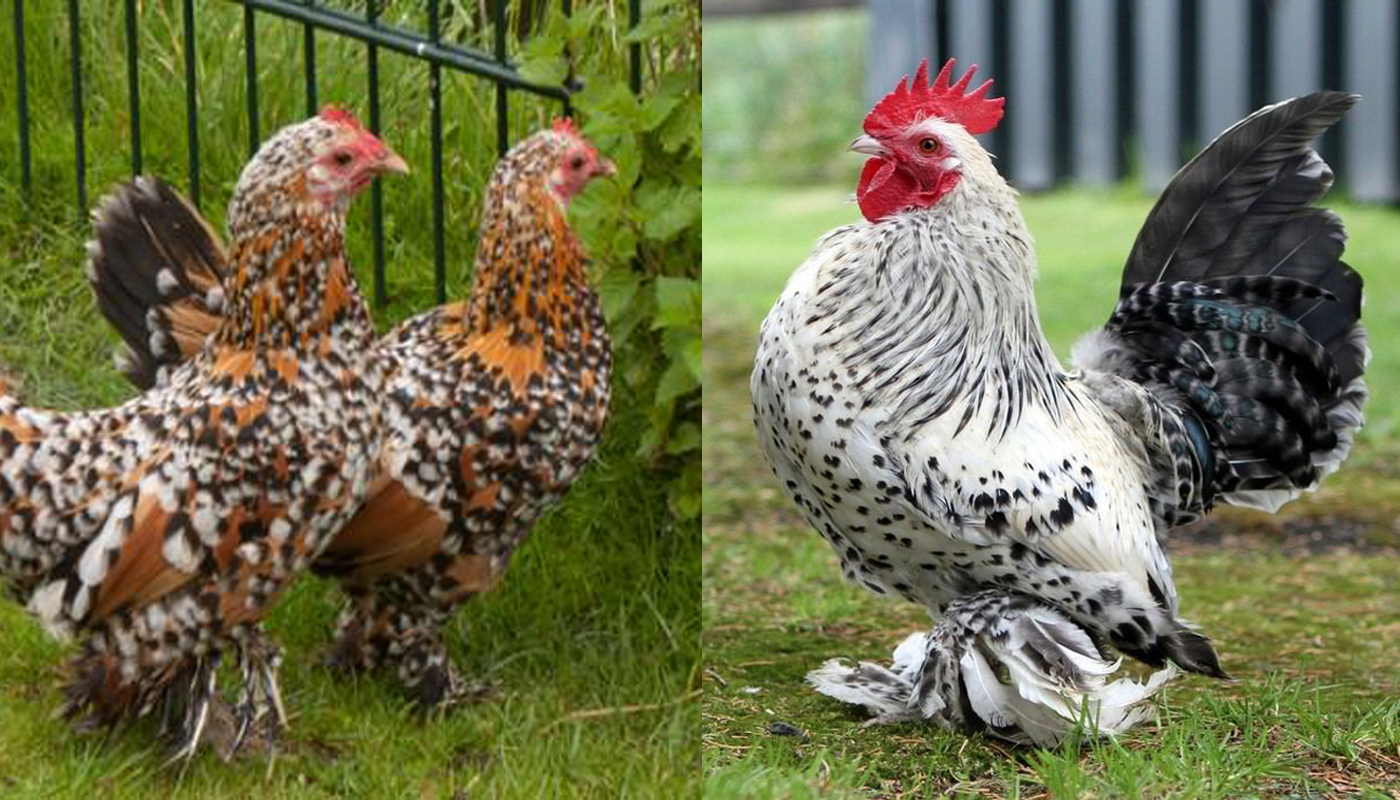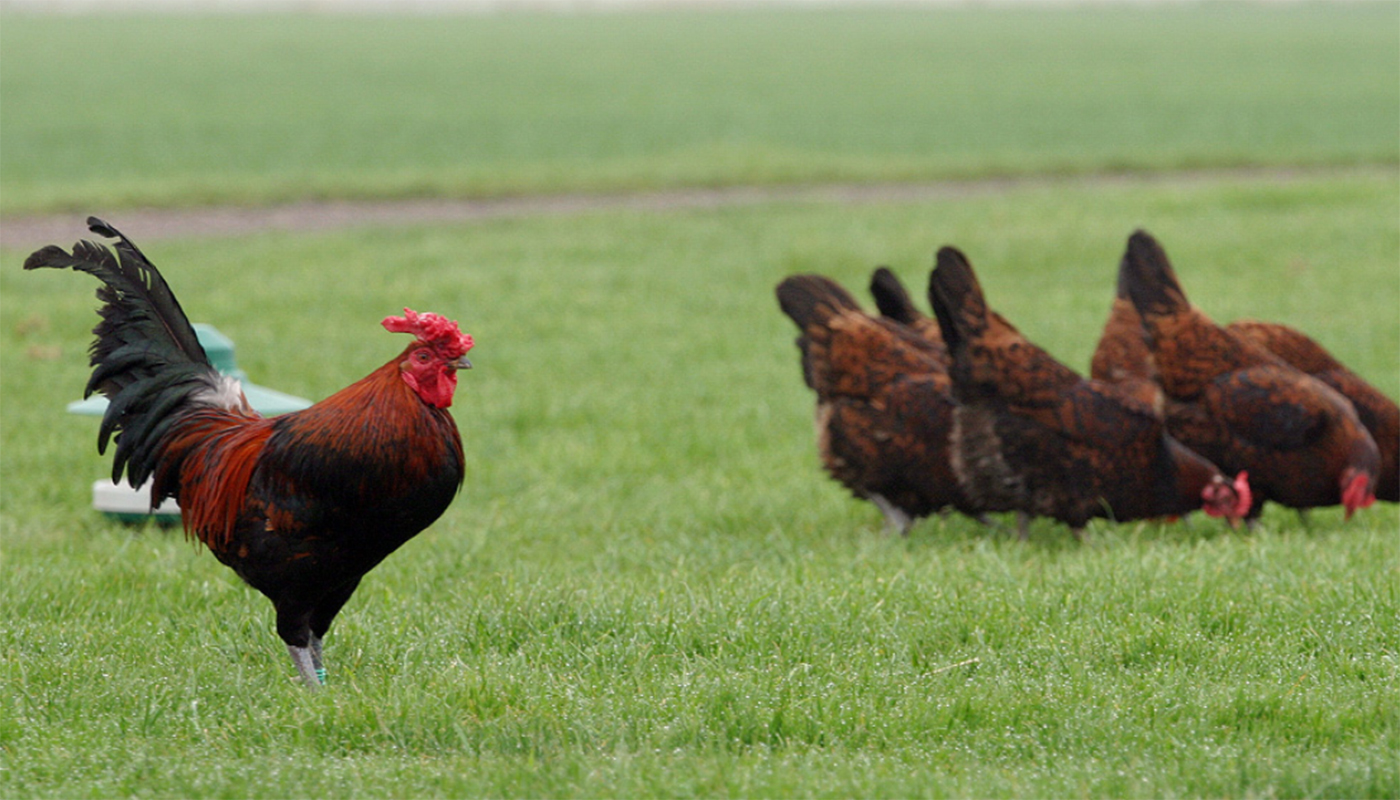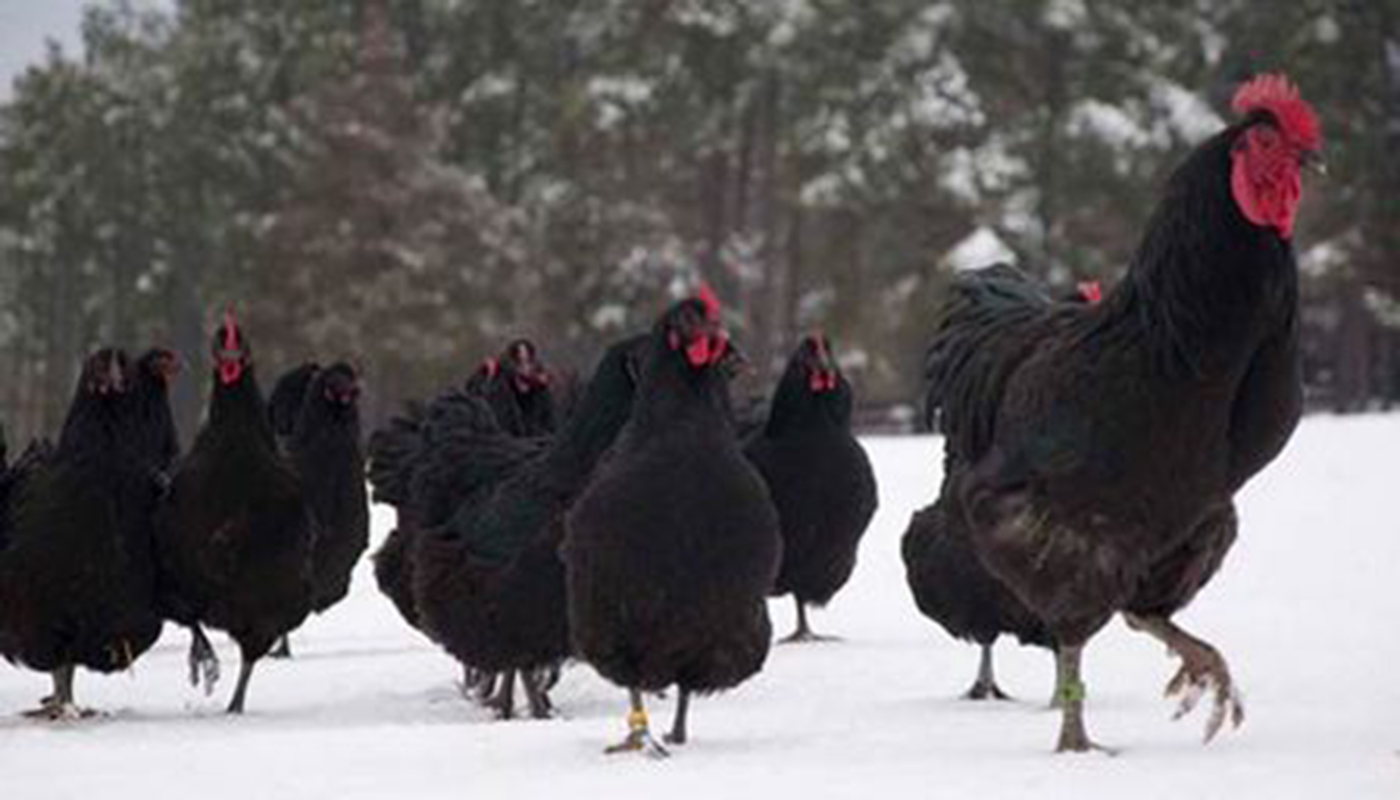
Dominique, also known as the Pilgrim Fowl or Dominicker is said to be one of the older chicken breeds in America. This chicken was a popular homesteading chicken in the 1800’s and was valued for its medium-sized brown eggs, meat and their feathers for highly sought after as stuffing for pillows and mattresses.
Their beautiful black and white plumage make them look like they have fine checks on their feathers. Their good nature, hardy bearing and self-sufficiency make them a value to any back-garden flock. Their tendency to prefer the bounty of food they find foraging about makes them eat a lot less normal feed than most other breeds of chicken.
| Country of Origin: | America |
| American Poultry Association: | Recognized as a breed of chicken in the United States |
| Chicken Category: | Large Breed |
| Chicken Class: | American |
| Bantam Variety Available? | Yes – Rose Comb Clean Legged Bantam Classification |
| Related | TOP 10 BANTAM CHICKEN BREEDS FOR BEGINNERS |
| Good Starter Chicken? | They are a low maintenance chicken with a nature that makes them perfect as a starter chicken. |
| Related | 10 BEST STARTER CHICKENS FOR THE FIRST TIME POULTRY KEEPER |
PURPOSE⇒ |
Eggs: They are very good egg layers.
They lay medium sized brown eggs from 230 – 270 per year They will lay consistently throughout winter and summer They start to lay eggs from around 22 weeks old.
Meat: They have yellow meat which was used as a table bird
Breeding: They can be bred and they hens do get broody they are also excellent nurturing mothers and brood hens.
If you are breeding the Dominique for show choosing the correct hens and rooster bloodline is crucial. This may be difficult due to the low number of viable chickens.
Foraging: They love to scratch and forage about preferring to eat what they find in the garden. But do well in confinement as long they are able to get to stretch their legs or at least have fresh patches of grass to forage in.
Show Bird: Their magnificent plumage and the way they carry themselves make them excellent show birds.
Pets: They are calm, nurturing friendly nature make them excellent pets
Other: These chickens have a unique social structure where the older chickens will go into the coop first generally leaving the pullets and cockerels to wander around the run for a bit before they join the older birds in the coop. The younger birds have a tendency to show respect to the older birds.
|
| Flyers? | They are good flyers but are not too flighty. |
| Noisy Birds? | They are not too noisy unless they are unhappy about something and feel the need to voice their ire. |
| Interaction with other chickens: | They get along well with other breeds. As with any flock if you are introducing new birds it is best to slowly socialize them with the flock. |
| Good with kids? | Their calm nature makes them a great pet to have around children. |
| Related | 10 ROOSTER BREEDS THAT DO NOT MIND CHILDREN |
HISTORY
The Dominique is classified as the oldest breed of chicken in America. It originated from Quebec which at the time was known as New France.
These birds have a very distinct appearance with their unusual rose comb and heavy black and white striped plumage that makes them look like they have black and white checks or dots. This pattern is known as barring and they seem to look a bit like the Barred Rocks breed. The best way to distinguish between the two is their combs as the Barred Rocks have a single comb and the Dominique’s has as a rose comb.
This once very popular homestead bird has been known to have the calmest and friendly nature, however, the roosters can sometimes be more aggressive than some game chickens. The roosters have been known to attack and kill, mink, snakes, rats, mice and even some small cats.
This breed of chicken went on the decline with the introduction of the Plymouth Rock and its numbers had dwindled so drastically that the American Livestock Conservancy listed the breed as critical.
Thanks to breeders with interest in heritage and rare chicken breeds the numbers of these birds rose but they are still listed as watch.
CHARACTERISTICS |
|
|---|---|
IDENTIFICATION⇒ |
Appearance/Body: These beautiful birds have a black and white plumage known as barred or cuckoo. The fluffy soft feathers give them good winter coverage. They have clean yellow legs, beak and skin. Their wattles, comb and earlobes are bright red.
Color(s) Black and white barred/cuckoo
Comb: They have a rose comb
Ave. Weight: Pullet/Hen 4 – 6 lbs.
Cockerel/Rooster 6 – 7 lbs. |
| Life Expectancy: | The average lifespan is 8 – 12 years |
| Health: | They have no known health issues and are quite a hardy self-sufficient bird. |
| You may Also Like: | HOW TO TELL IS A CHICKEN IS SICK |
| Temperament: | Gentle, calm, friendly and nurturing chickens |
| Socialize Behavior? | They get along well with all other animals |
| You may Also Like: | HOW TO SOCIALIZING YOUR NEW CHICKENS |
| Known predators: | Most domestic animals leave them alone, but it is always best to keep an eye on dogs and cats. If you have a rooster watch for aggression towards smaller pets. If hawks and or foxes are in your area it is always best to take precautions. Check with local animal shelters, zoos, vets, animal control and or pet stores about common predators in your area. |
| Conservation Status: | These birds conservation status is recorded as “watch”. It is best to check on any special license or instructions that may be set up for owning these birds. This can be checked with your local or national conservation centers. |
IDEAL ENVIRONMENT |
|
|---|---|
| Garden Size: | They adapt well to most sized gardens and take confinement well. However, they are more of a free-range bird that loves to live off the land. |
| Ideal Climate: | They are very hardy birds that handle the cold very well and as long as there is a lot of shady spots and nice cool water summer is not a problem for these magnificent chickens |
| Ideal Coop: | The rule of thumb for any coop is 50 cm x 50 cm per hen/rooster in the coop. Ensure there is a good space for the nesting boxes and nightly roosting rails at least 1.5 inches wide. Good ventilation for air but not too drafty especially in winter. It is always a good idea to raise the coop off the ground to give the birds a dry place to roost and lay especially in wet weather. |
| Ideal Coop Run: | They can and will fly, especially to get to a tree branch to roost. It is advisable to fully cover the coop run it is always advisable in order to give the birds a safe secure environment. |
| Ideal Flock Size: | They are quite happy in any size flock as long as they have one companion to forage and free-range with. |
| Special Instructions: | They may need some special attention as a bird on the Livestock conservation list. |
| Accessories: | The following accessories are ideal for your coop: Nesting boxes Straw for the boxes and roosting area Roosting rails Perches Water troughs/bowls Food bowls/feeders Heating lamp(s) Animal carrier for transport purposes |
| You may Also Like: | 45 FREE DIY CHICKEN COOP PLANS, TUTORIALS AND DESIGNS |
WHERE TO FIND THESE BIRDS TO ADD TO YOUR FLOCK
These heritage chickens are unlikely to be found at any live poultry outlets and farms. To find check on the Live Stock conservancy website or the Dominique Club of America which will also have a host of valuable information. They will also be able to help with any special requirements, attention or care they may need. If you plan on breeding your chickens, you will want to make sure that they are from a good bloodline.
CARING FOR THE BIRD(S)
Please click here for our full guide to “Taking care of chickens”. This is a comprehensive guide to owning chickens. It covers where to start from choosing your ideal flock, the coop that would best suit your garden, your bird and you to buying and bringing your bird(s) home.
GENERAL
These heritage chickens make a great addition to any back-garden flock. Check with the breeders if you wish to get involved in the recovery of this great breed of chicken.
GROOMING
These chickens do love their dust bath and will love some added herbal essences mixed into the loose sand to help with pests and excess feather oils. They have been known to like the attention giving these chickens a regular examination for mites, lice and various other parasites should not be a troublesome task. Checking for these pests in their feathers should be done at least once a week to your chickens healthy. Always get your birds de-wormed on a regular basis especially if they are around other animals or interacting with kids.
DIET AND NUTRITION
Give your Dominique(s) a balanced diet of chicken pellets, grains, chicken mash or grain mix from 8 weeks old and older. This should be fed to them first thing in the morning before they are let out to roam about to ensure they are getting all their nutrients. These birds will eat almost half the amount of other chickens as they like to keep their appetite for the tidbits they find whilst foraging about free-ranging in the garden.
For baby chickens, the best is always Chick Starter when they are under 8 weeks old.
Laying hens should get extra protein and calcium in their diets to ensure the quality of their eggs and to keep them in tip-top health.
As with any chicken they are partial to table scraps in the form of vegetables and fruit. They find these scraps even better if they are served as ice-cubes on very hot days.
Feeding your chickens correctly will give your organic garden a lot of nutritious fertilizer to make your vegetables or flowers grow.
Please see our comprehensive guide to “Feeding your chickens” for more information of the different types of chicken feed for chicks, hens, laying hens, roosters, etc. and where to buy the feed and approximate cost of the feed.
SOCIALIZING THE BIRD(S)
Although they are not difficult birds to socialize with other breeds they do have rather a unique pecking order structure. It is best to find a breed that will respect this to introduce to your already established flock of Dominique(s).
Always check on how well a breed will get on with your current flock before buying them as you do not want to upset your coop or stress your current flock.
with any newcomer to the roost, you will have to quarantine the bird for 7 – 31 days to ensure it does not have any unwanted critters or disease that could spread to your current flock.
Even though they are quite laid back and somewhat traditional birds they do have a strict pecking order, so it is advisable to socialize a newcomer slowly and determine when it is right to allow them to become a permanent part of the flock.
NOTES / SPECIAL INSTRUCTIONS
As they are registered as a “watch” conservation status they may need an extra license to own or keep in your garden. For advice on what the bird’s conservation status and orders are please check with your local conservation department.
For breeders, it is imperative that you always check your bird’s bloodlines and ensure you are buying your birds from a reputed breeder/farm. In order to sell birds of such stature, they have to be recorded and documented, always check with local animal breeding organizations for these records.
For information and advice on adopting rescued animals, you can visit or contact your local animal welfare center.
Video
USEFUL LINKS
- Caring for your Chicken
- Feeding
- Health
- Socializing your Chicken
- Breeding Chicken
- Raising Chickens A-Z
- Hatching Eggs
- What is Molting
- Animal Shelter (ASPCA)
- American Veterinary Medical Association
- American Poultry Association
- American Animal Welfare Society
- American Animal Control
- American Animal Husbandry Society
References
- https://en.wikipedia.org
- https://livestockconservancy.org
- https://www.roysfarm.com
- https://www.mypetchicken.com
- https://www.backyardchickens.com
- https://www.feathersite.com/
 Booted Bantam Chicken Breed – Everything You Need to Know
Booted Bantam Chicken Breed – Everything You Need to Know Araucana Chicken Breed – Everything You Need to Know
Araucana Chicken Breed – Everything You Need to Know BEST TEMPORARY/PORTABLE CHICKEN RUNS FOR THE BACK GARDEN TO BUY
BEST TEMPORARY/PORTABLE CHICKEN RUNS FOR THE BACK GARDEN TO BUY Redcap Chicken Breed – Everything You Need to Know
Redcap Chicken Breed – Everything You Need to Know 45 FREE DIY CHICKEN COOP PLANS, TUTORIALS AND DESIGNS
45 FREE DIY CHICKEN COOP PLANS, TUTORIALS AND DESIGNS 80+ Best Chicken Coops and Runs to Buy
80+ Best Chicken Coops and Runs to Buy Holland Chicken Breed – Everything You Need to Know
Holland Chicken Breed – Everything You Need to Know MOLTING – WHY, HOW, WHEN AND CAN WE HELP THEM?
MOLTING – WHY, HOW, WHEN AND CAN WE HELP THEM? Jersey Giant Chicken Breed – Everything You Need to Know
Jersey Giant Chicken Breed – Everything You Need to Know 10 Beautiful Black and White Feathered Chicken Breeds
10 Beautiful Black and White Feathered Chicken Breeds Old English Game Chicken Breed – Everything You Need to Know
Old English Game Chicken Breed – Everything You Need to Know Serama Chicken Breed – Everything You Need to Know
Serama Chicken Breed – Everything You Need to Know